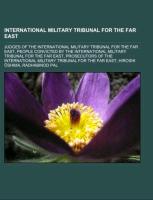International Military Tribunal for the Far East
BücherAngebote / Angebote:
Source: Wikipedia. Pages: 32. Chapters: Judges of the International Military Tribunal for the Far East, People convicted by the International Military Tribunal for the Far East, Prosecutors of the International Military Tribunal for the Far East, Hiroshi Oshima, Radhabinod Pal, Sadao Araki, Kuniaki Koiso, Xiang Zhejun, Kanji Ishiwara, Hiranuma Kiichiro, Shigetaro Shimada, Shunroku Hata, Shigenori Togo, Yoshijiro Umezu, Arthur Comyns Carr, Jiro Minami, Koichi Kido, William Webb, Kingoro Hashimoto, Naoki Hoshino, John Patrick Higgins, Tokyo Trial, Alan Mansfield, Edward Stuart McDougall, Mei Ju-ao, Henry Grattan Nolan, Toshio Shiratori, Hirota v. MacArthur, Erima Harvey Northcroft, Joseph B. Keenan, Okinori Kaya, Justice Erima Harvey Northcroft Tokyo War Crimes Trial Collection. Excerpt: The International Military Tribunal for the Far East (IMTFE), also known as the Tokyo Trials, the Tokyo War Crimes Tribunal or simply as the Tribunal, was convened on April 29, 1946, to try the leaders of the Empire of Japan for three types of crimes: "Class A" crimes were reserved for those who participated in a joint conspiracy to start and wage war, and were brought against those in the highest decision-making bodies, "Class B" crimes were reserved for those who committed "conventional" atrocities or crimes against humanity, "Class C" crimes were reserved for those in "the planning, ordering, authorization, or failure to prevent such transgressions at higher levels in the command structure." The Tokyo trials were not the only forum for the punishment of Japanese war criminals, merely the most visible. In fact, the Asian countries victimized by the Japanese war machine tried far more Japanese-an estimated five thousand, executing as many as 900, and sentencing more than half to life in prison. Twenty-eight Japanese military and political leaders were charged with Class A crimes, and more than 5, 700 Japanese nationals were charged with Class B and C crimes, mostly entailing prisoner abuse. China held 13 tribunals of its own, resulting in 504 convictions and 149 executions. The Japanese Emperor Hirohito, and all members of the imperial family such as Prince Asaka, were not prosecuted for any involvement in any of the three categories of crimes. Herbert Bix explains that "the Truman administration and General MacArthur both believed the occupation reforms would be implemented smoothly if they used Hirohito to legitimize their changes." As many as 50 suspects, such as Nobusuke Kishi, who later became Prime Minister, and Yoshisuke Aikawa, head of the zaibatsu Nissan, and future leader of the Chuseiren, were charged but released without ever being brought to trial in 1947 and 1948. Shiro Ishii received immunity in exchange for data gathered from his experiments on live
Folgt in ca. 5 Arbeitstagen
